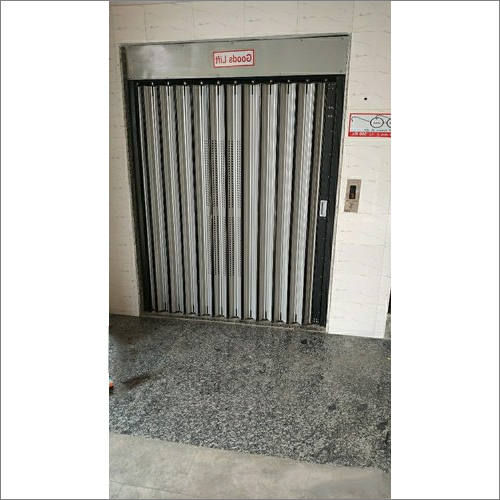Welcome To Our Company

Mild Steel Goods Elevator
160000 INR/Unit
Product Details:
- Type Scissor Lift
- Material Aluminum Alloy
- Drive Type AC DC Hydraulic
- Click to View more
X
Mild Steel Goods Elevator Price And Quantity
- 160000 INR/Unit
- 1 Unit
Mild Steel Goods Elevator Product Specifications
- Aluminum Alloy
- Scissor Lift
- AC DC Hydraulic
Mild Steel Goods Elevator Trade Information
- Asia South America Africa
- All India
Product Description
A mild steel goods elevator, also sometimes called a cargo elevator or freight elevator, is a heavy-duty elevator designed specifically for transporting goods and materials within a building. Here's a closer look at its key characteristics and uses:Material and Construction:
Mild Steel: The primary structure is built from mild steel, a cost-effective and robust material that offers good strength and durability for handling heavy loads.
Functionality:
Lifting Capacity: These elevators are designed to handle significantly more weight compared to passenger elevators. Typical capacities range from a few tons to tens of tons, depending on the specific model.
Drive System: Two common drive systems are used:
Hydraulic: Utilizes a hydraulic cylinder and piston mechanism powered by a hydraulic pump. This system offers smooth operation and is often used for lower travel heights.
Traction Drive: Similar to passenger elevators, it uses an electric motor, gearbox, and hoisting ropes to raise and lower the elevator platform. This system is suitable for higher travel heights and heavier loads.
Simple Design: Goods elevators often prioritize functionality over aesthetics. They typically have a basic enclosure with a focus on durability and ease of loading and unloading cargo.
Door Options: Depending on the application, they may have single or double swing doors, bi-folding doors, or rolling steel doors to accommodate various cargo shapes and sizes.
Applications:
Warehouses and Distribution Centers: For moving pallets, boxes, and other heavy items between floors.
Manufacturing Facilities: Transporting machinery, parts, and materials within a production environment.
Loading Docks: Transferring goods between different levels in a loading dock area.
Parking Garages: Moving vehicles between parking levels, particularly in multi-story parking structures.
Benefits of Mild Steel Goods Elevators:
Cost-Effective: Generally less expensive than passenger elevators due to simpler design and materials.
Durability: Built to withstand heavy loads and frequent use in industrial settings.
Versatility: Can be customized with various capacities, door options, and platform sizes to suit specific needs.
Efficiency: Improves workflow and productivity by streamlining the vertical movement of goods within a building.
Things to Consider When Choosing a Mild Steel Goods Elevator:
Capacity: The weight limit you need the elevator to handle.
Travel Height: The number of floors the elevator needs to service.
Platform Size: The minimum dimensions required to accommodate your largest cargo.
Doorway Size: Should be large enough for easy loading and unloading.
Drive System: Hydraulic for lower heights and smoother operation, traction drive for higher heights and heavier loads.
Local Regulations: Ensure the elevator meets all safety and building code requirements
Enter Buying Requirement Details


 Send Inquiry
Send Inquiry Send SMS
Send SMS Call Me Free
Call Me Free